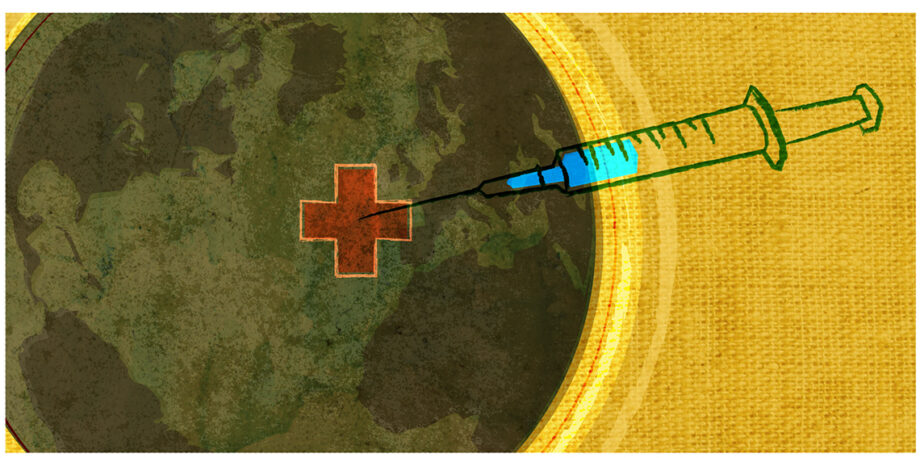April 15, 2015 — Ever since a small percentage of U.S. parents decided to delay or forgo vaccinating their children against diseases like measles and whooping cough — some of which have been declared eliminated in the U.S. — many people have been upset, saying that parents of unvaccinated kids are putting everyone in danger. Those parents, the reasoning goes, are not upholding their end of a social contract we all should agree upon — one that calls for collective action for the common good.
This idea is somewhat unflatteringly known as “herd immunity.” Of course, the idea did not originate from the current vaccine debate, most recently at its peak over the winter of 2015. That debate has only served to highlight it for current observers. When specifically discussing vaccination, the idea is that those healthy enough to receive vaccines should be vaccinated — not just to keep themselves safe, but for the well-being of all, because as more people get vaccinated, the risk of exposure drops.
As has been pointed out by others, many parents today have a luxury not afforded previous generations whose children faced things like living with “iron lungs” as a result of polio. While the effects of measles and whooping cough are often less alarming, many believe today’s vaccines are facing opposition as a direct result of their success, where parents fortunate enough (and often that “fortunate” can be defined as monetarily well off) to have never seen the aftermath of such diseases no longer see the need for treatment against them.
And of course vaccines aren’t the only public health measure that has helped overcome threats to public health and save lives. Sanitation systems that reduced the spread of cholera are another example. Many people living with toilets and running water today may have a similarly difficult time imaging a world where “going to the bathroom” could spread deadly diseases — as it still does in many poor countries.
I support the idea of collective action for the common good. But I would like to see this idea applied more widely — specifically, to the adverse environmental conditions that, thanks to our collective actions (and, more importantly, our collective inactions), are contributing to the emergence of a world that is a more dangerous place to live, especially for those who, as in the vaccine debate, are “at risk” — the poor, children, elderly. We have too often failed to collectively act to protect them and ourselves against the environmental crises we are creating and facing.
It’s easy to make the case that we need to work together to reduce the sources contributing to a lower quality of life for millions of people or worse, killing them.
Richard Fuller, president of Pure Earth, an organization that works to clean up communities around the world where toxin substances greatly affect health, recently wrote in Ensia that pollution killed about 9 million people around the world in 2012, and the vast majority of those were the poorest and most at-risk people in the world, incapable of simply moving away from polluted areas. “Our economy is global and so are the pollutants it generates,” Fuller wrote. “Contaminated air from China can now be measured in other countries. Mercury from gold mining and coal plants can be found in fish, and arsenic has been found in rice. Many highly polluting industries have moved from developed countries to poor countries with less environmental regulation and technology to manage and remediate chemicals.” Compare that 9 million to the 668 cases of measles reported in the U.S. to the Centers for Disease Control and Prevention in 2014, and it’s easy to make the case that we need to work together to reduce the sources contributing to a lower quality of life for millions of people or worse, killing them.
Climate change, meanwhile, more than any other threat in the history of humanity, calls for collaboration — not just for the well-being of our society, but for our very existence as we know it. Yet, not only have we failed to act together on this problem, it has somehow become one of the most divisive topics we have ever faced.
There is also a social contract we should have with future generations and nature itself. As we exacerbate extreme weather, plasticize and acidify oceans, clear-cut forests, pollute the air, destroy biodiversity, deplete and pollute water, and more, we fail to uphold our end of that contract by failing to ensure the continuation of the systems that make vibrant and healthy lives for future generations possible.
If we get down to it, a lack of solutions isn’t really the problem we face today — only the will to implement them.
I don’t live in an area of the world likely to face the worst of environmental consequences, now or in the future. So, believe me, I understand the inclination to call for action on things that seem more immediately relevant to one’s life. Unlike the possible repercussions of an unvaccinated child in our midst, the environmental effects of our lifestyles often manifest themselves among unknown people in far-off places and in future times (we reap the benefits today, but don’t realize the harm until much later). So, as the world warms and other people suffer the consequences of our collective assaults on the environment, it’s easier (and natural) to debate choices that are closer to home, but don’t have the same impact on a scale across time and place. It seems hard to solve all the world’s problems, so we focus on issues we feel we can solve. But it’s simply not fair to reap the benefits of our lifestyles while outsourcing the costs to other people, places and times.
If we get down to it, a lack of solutions isn’t really the problem we face today — only the will to implement them. We’ve known for decades what it will take to slow the warming of our planet and reduce pollution. This year there seems to be more cause for optimism than there has been in some time as countries start to take seriously the need to reduce greenhouse gas emissions, which will hopefully lead to a international agreement at COP 21 in Paris. We should all be pressuring political officials, from city council members to heads of state, to lead on these matters and push for reforms on a global system that has for too long been allowed to run wild, with its actual effects on people and the planet being dismissed as “externalities,” as though what happens to other parties is somehow less important than what happens to the bottom line. Along those lines, economists and others seem to agree that an appropriate price on carbon is one of the most effective ways to quickly reduce emissions and help get us on the road to fixing the world around us and making it a more livable place for everyone, especially the poor and disenfranchised.
Of course there are countless ways we all can take action everyday, too. When prices of gas drop, it’s discouraging to see sales of trucks and SUVs rise. Too often, recycling rates are paltry as landfills continue to fill with trash and oceans with plastic. Inefficient homes fail to keep heat and cold air inside, leading to increased heating and cooling and more emissions. The easiest changes to enact immediately are those we can vote on with our dollars. Purchases can be made through companies that provide data on the sustainability of their supply chains. Convenience items such as plastic water bottles that end up in the ocean can be easily avoided with just a little thought and planning. Residential and commercial solar and wind energy are today more competitive than ever, at times beating fossil-fuel competitors on price. The same can be said for sustainable food options, a market that is growing on grocery-store shelves and restaurant tables. Ditto hybrid and battery-powered vehicles. There are countless ways we each can take action every day, and most of us can do a little or a lot better on many fronts.
And that, ultimately, is the point. If we step back and look at the bigger picture, we’d see that there is a lot more blame to be placed than on a small group of well-off parents in northern California questioning vaccines for their kids. Of course this isn’t an either/or argument — there will always be more than one issue people are allowed to discuss and debate. But as the idea of working together for the benefit of all rises is the public consciousness through the current vaccine debate, I hope there is room to broaden the scope of the concern for the common good to include a whole host of consequential things negatively affecting billions of people — which we can deal with if we all agree to act together. ![]()
Editor’s note: The views expressed here are those of the author and not necessarily of Ensia. We present them to further discussion around important topics. We encourage you to respond with a comment below, following our commenting guidelines, which can be found here. In addition, you might consider submitting a Voices piece of your own. See Ensia’s “Contact” page for submission guidelines.
Ensia shares solutions-focused stories free of charge through our online magazine and partner media. That means audiences around the world have ready access to stories that can — and do — help them shape a better future. If you value our work, please show your support today.
Yes, I'll support Ensia!

